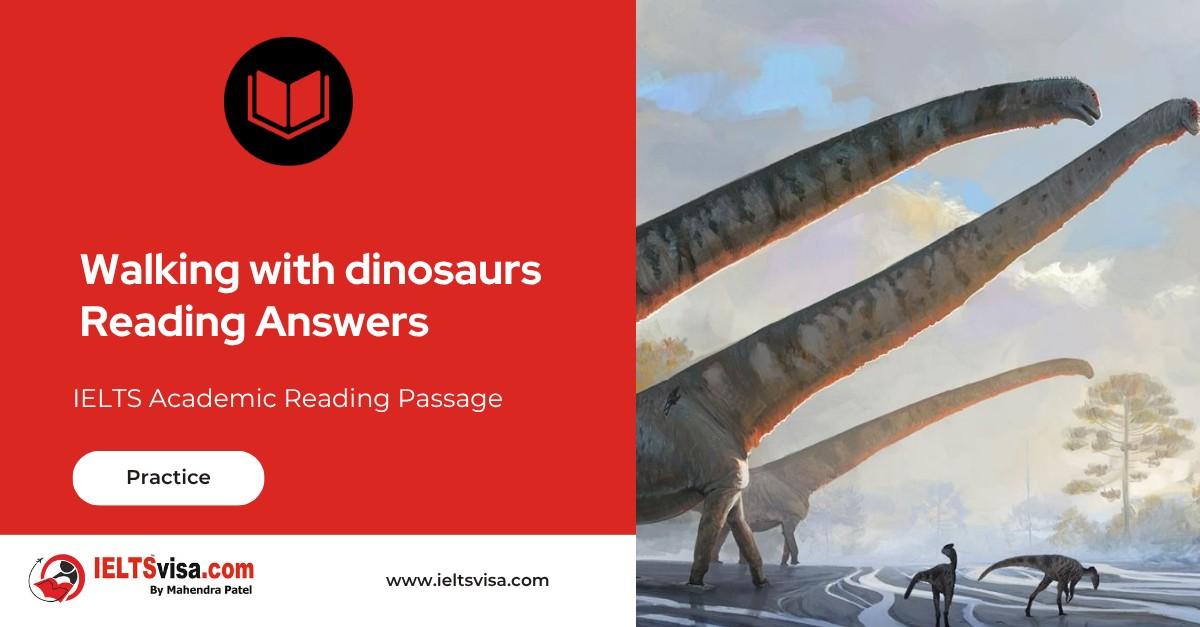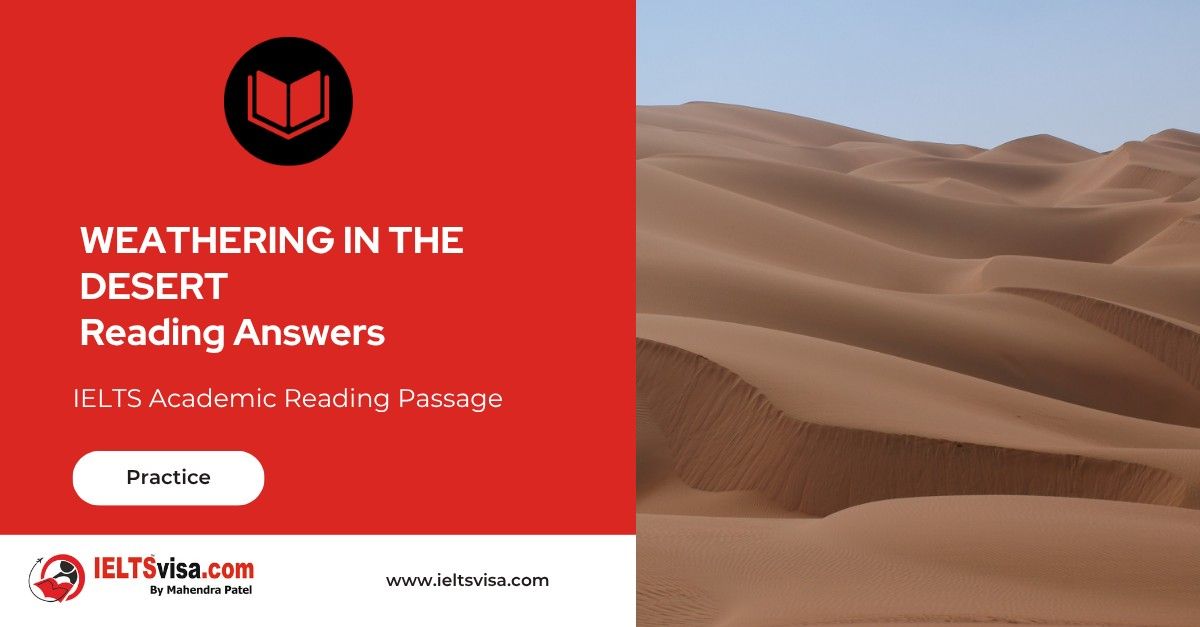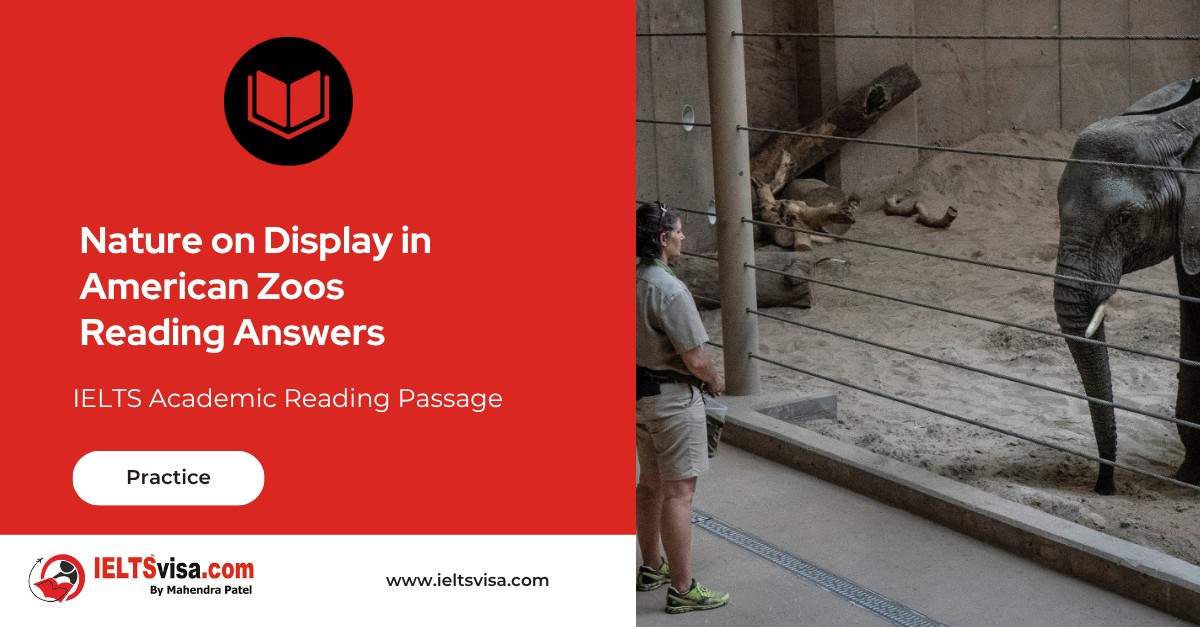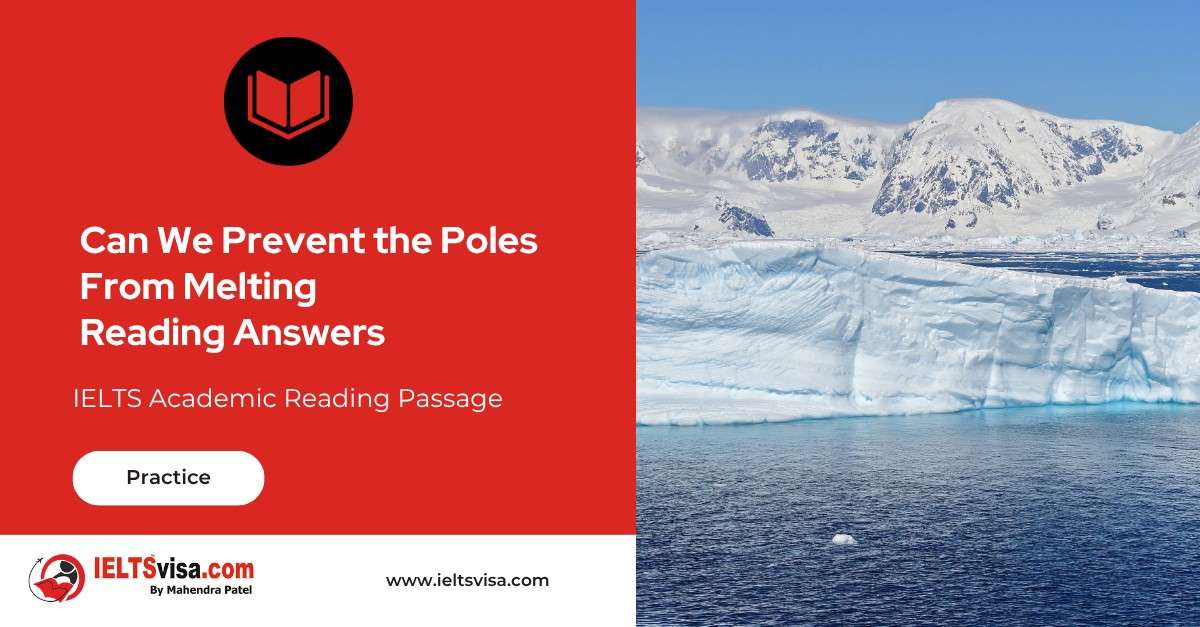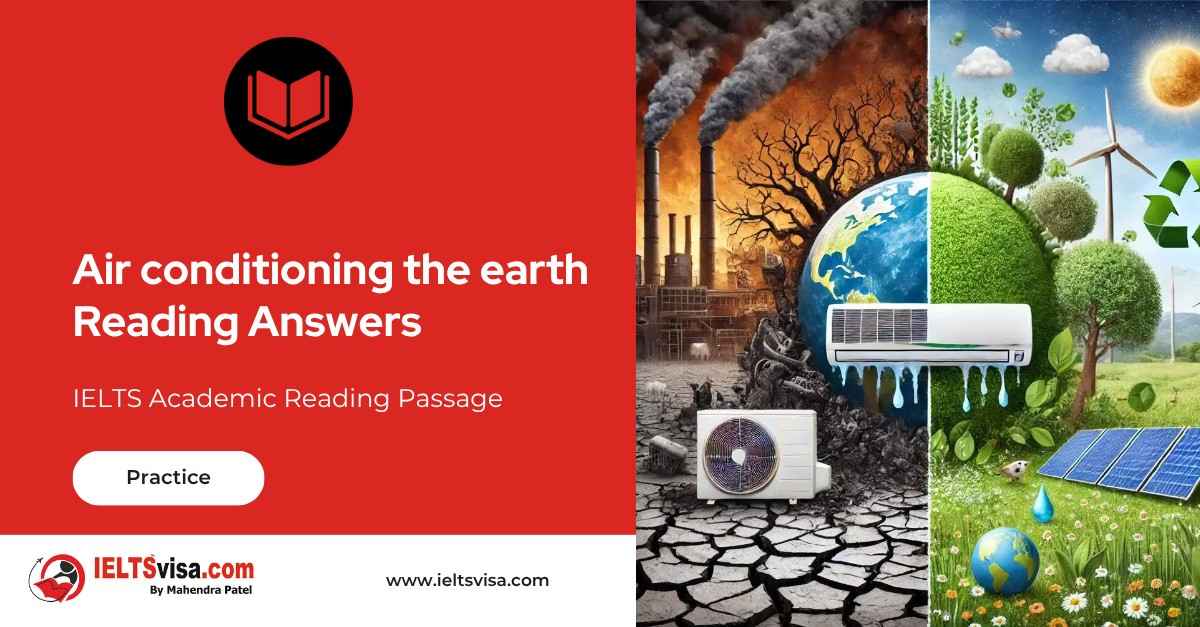Adam’s Wine Reading Answers
IELTS Academic Reading Passage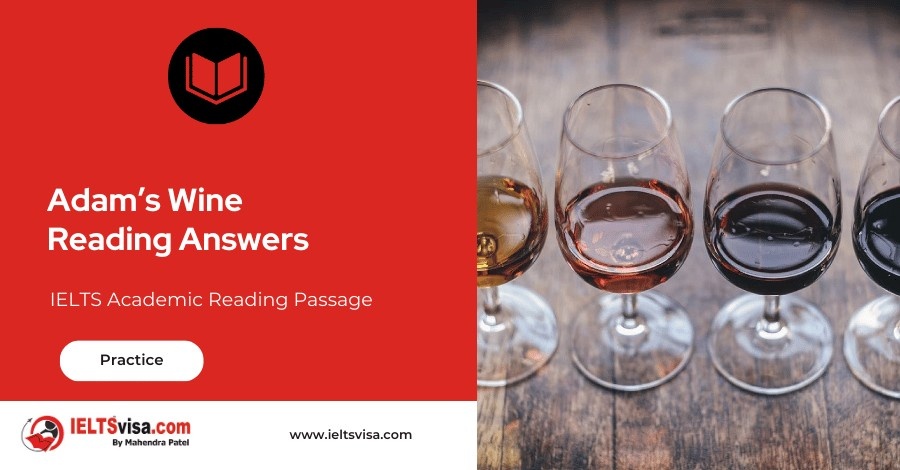
A A Water is the giver and, at the same time, the taker of life. It covers most of the surface of the planet we live on and features large in the development of the human race. On present predictions, it is an element that is set to assume even greater significance.
B Throughout history, water has had a huge impact on our lives. Humankind has always had a rather ambiguous relationship with water, on the one hand receiving enormous benefit from it, not just as a drinking source, but as a provider of food and a means whereby to travel and to trade. But forced to live close to water in order to survive and to develop, the relationship has not always been peaceful or beneficial. In fact, it has been quite the contrary. What has essentially been a necessity for survival has turned out in many instances, to have a very destructive and life-threatening side.
C Through the ages, great floods alternated with long periods of drought have assaulted people and their environment, hampering their fragile fight for survival. The dramatic changes to the environment that are now a feature of our daily news are not exactly new: fields that were once lush and fertile are now barren; lakes and rivers that were once teeming with life are now long gone; savannah has been turned to desert. What perhaps is new is our naive wonder when faced with the forces of nature.
D Today, we are more aware of climatic changes around the world. Floods in far-flung places are instant hews for the whole world. Perhaps these events make us feel better as we face the destruction of our own property by floods and other natural disasters.
E In 2002, many parts of Europe suffered severe flood damage running into billions of euros. Properties across the continent collapsed into the sea as waves pounded the coastline wreaking havoc with sea defences. But it was not just the seas. Rivers swollen by heavy rains and by the effects of deforestation carried large volumes of water that wrecked many communities.
F Building stronger and more sophisticated river defences against flooding is the expensive short-term answer. There are simpler ways. Planting trees in highland areas, not just in Europe but in places like the Himalayas, to protect people living in low-lying regions like the Ganges Delta, is a cheaper and more attractive solution. Progress is already being made in convincing countries that the emission of carbon dioxide and other greenhouse gases is causing considerable damage to the environment. But more effort is needed in this direction.
G And the future? If we are to believe the forecasts, it is predicted that two¬thirds of the world population will be without fresh water by 2025. But for a growing number of regions of the world, the future is already with us. While some areas are devastated by flooding, scarcity of water in many other places is causing conflict. The state of Texas in the United States of America is suffering a shortage of water with the Rio Grande failing to reach the Gulf of Mexico for the first time in 50 years in the spring of 2002, pitting region against region as they vie for water sources. With many parts of the globe running dry through drought and increased water consumption, there is now talk of water being the new oil.
H Other doom-laden estimates suggest that, while tropical areas will become drier and uninhabitable, coastal regions and some low-lying islands will in all probability be submerged by the sea as the polar ice caps melt. Popular exotic destinations now visited by countless tourists will become no-go areas. Today’s holiday hotspots of southern Europe and elsewhere will literally become hotspots – too hot to live in or visit. With the current erratic behaviour of the weather, it is difficult not to subscribe to such despair.
I Some might say that this despondency is ill-founded, but we have had ample proof that there is something not quite right with the climate. Many parts of the world have experienced devastating flooding. As the seasons revolve, the focus of the destruction moves from one continent to another. The impact on the environment is alarming and the cost to life depressing. It is a picture to which we will need to become accustomed.
Questions 1-8
The Reading Passage has eight paragraphs, labelled A-I.
Choose the most suitable headings for paragraphs B-I from the list of headings below.
Write the appropriate numbers (i-xiii) in boxes 1-8 on your answer sheet.
One of the headings has been done for you as an example.
Note: There are more headings than paragraphs, so you will not use all of them.
List of Headings
i. Environmental change has always been with us
ii. The scarcity of water
iii. Rivers and seas cause damage
iv. Should we be despondent? Or realistic?
v. Disasters caused by the climate make us feel better
vi. Water, the provider of food
vii. What is water?
viii. How to solve flooding
ix. Far-flung flooding
x. Humans’ relationship with water
xi. The destructive force of water in former times
xii. Flooding in the future
xiii. A pessimistic view of the future
|
Example Answer Paragraph A vii |
1 Paragraph B
2 Paragraph C
3 Paragraph D
4 Paragraph E
5 Paragraph F
6 Paragraph G
7 Paragraph H
8 Paragraph I
Questions 9-15
Choose the appropriate letters A-D and write them in boxes 9-15 on your answer sheet.
9 The writer believes that water
A is gradually becoming of greater importance.
B will have little impact on our lives in future.
C is something we will need more than anything else.
D will have even greater importance in our lives in the future.
10 Humankind’s relationship with water has been
A two-sided.
B one-sided.
C purely one of great benefit.
D fairly frightening.
11 The writer suggests that
A we are in awe of the news we read and see on TV every day.
B change to the environment leaves us speechless.
C we should not be in awe of the news we read and see on TV every day.
D our surprise at the environmental change brought about by nature is something new.
12 According to the text, planting trees
A has to be co-ordinated internationally.
B is more expensive than building sea and river defences.
C is a less expensive answer to flooding than building river defences.
D is not an answer to the problem of flooding in all regions.
13 By 2025, it is projected that
A at least half the world population will have fresh water.
B the majority of the world population will have fresh water.
C one-third of the world population will have fresh water.
D fresh water will only be available to half of the world population.
14 According to the text, in the future low-lying islands
A will still be habitable.
B will not be under water.
C are likely to be under water.
D will probably not be under water.
15 According to the writer,
A people do not need to get used to environmental damage.
B people will need to get used to climate changes that cause environmental damage.
C people are now more used to environmental damage than they have been in the past.
D the general despondency about environmental changes is ill-founded.

Solution For: Adam’s Wine
Reading Answers
| 1 – x | 9 – D |
| 2 – i | 10 – A |
| 3 – v | 11 – D |
| 4 – iii | 12 – C |
| 5 – viii | 13 – C |
| 6 – ii | 14 – C |
| 7 – xiii | 15 – B |
| 8 – iv |
Review and Practice
- Regularly practice with IELTS reading samples and time yourself to get used to the pressure of the exam.
- Review your mistakes to understand where you went wrong and how to avoid similar errors in the future.
Our Books
Master IELTS Speaking Part 1
IELTS Writing Task 1 Book
IELTS Writing Task 2 Book
Adam’s Wine Reading Answers Explanation
Comin Soon
Practice IELTS Other Modules
IELTS Listening
The IELTS Listening test assesses how well you can understand spoken English in various contexts. It lasts about 30 minutes and is divided into four sections with a total of 40 questions. The listening tasks become increasingly difficult as the test progresses.
IELTS Academic Reading
The IELTS Academic Reading section assesses your ability to understand and interpret a variety of texts in academic settings. It is designed to evaluate a range of reading skills, including skimming for gist, reading for main ideas, reading for detail, understanding inferences, and recognizing a writer's opinions and arguments.
IELTS Speaking
The IELTS Speaking test assesses your ability to communicate in English on everyday topics. It lasts 11-14 minutes and consists of three parts: introduction, cue card, and a discussion based on the cue card topic.
IELTS General Reading
IELTS General Reading tests your ability to understand and interpret various types of texts. Here are some key areas and types of content you can expect to encounter in the reading section, along with tips for effective preparation.
IELTS Academic Writing Task 1
In IELTS Academic Writing Task 1, you are presented with a visual representation of information, such as graphs, charts, tables, or diagrams, and you are required to summarize, compare, or explain the data in your own words.
IELTS General Writing Task 1
In IELTS General Writing Task 1, you are required to write a letter based on a given situation. The letter can be formal, semi-formal, or informal, depending on the prompt. Here’s a breakdown of the key components to include in your letter
IELTS Academic Writing Task 2
In IELTS Academic Writing Task 2, you are required to write an essay in response to a question or topic. Here’s a guide to help you understand the essential elements of this task
IELTS Exam Tips
To succeed in the IELTS exam, practice regularly, familiarize yourself with the test format, improve your vocabulary, develop time management skills, and take mock tests to build confidence.
Grammer for IELTS
Grammar is the foundation of effective communication in English. Understanding tense usage, subject-verb agreement, and sentence structure enhances clarity and coherence in writing and speaking.
Vocabulary for IELTS
Vocabulary plays a crucial role in the IELTS (International English Language Testing System) exam, especially in the Speaking and Writing sections. Here’s an overview of why vocabulary is important and how it impacts your performance
RECENT IELTS SAMPLES QUESTIONS AND ANSWERS
Walking with dinosaurs
Peter L. Falkingham and his colleagues at Manchester University are developing techniques that...
Money as the Unit of Amount Reading Answers
The most difficult aspect of money to understand is its function as a unit of account. In...
WEATHERING IN THE DESERT
In the deserts, as elsewhere, rocks at the earth's surface are changed by weathering, which...
Nature on Display in American Zoos
The first zoo in the United States opened in Philadelphia in 1874, followed by the Cincinnati...
Can We Prevent the Poles From Melting
Such is our dependence on fossil fuels, and such is the volume of carbon dioxide we have...
Air conditioning the earth reading answers
The circulation of air in the atmosphere is activated by convection, the transference of heat...

